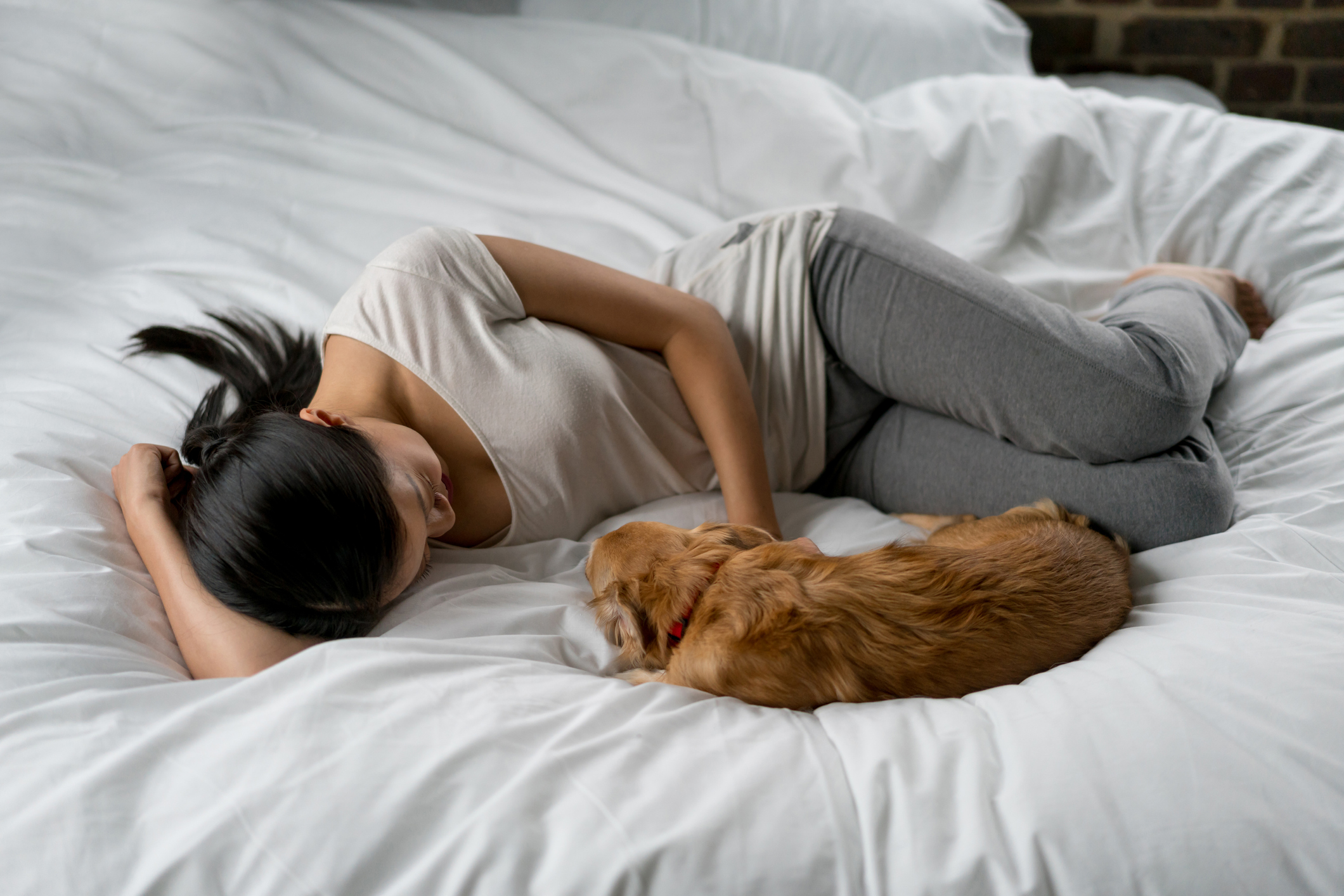How Your Furry Friend Can Benefit Your Sleep Cycle
If you’re one of the lucky people who is a pet caregiver, you probably have a pretty strong bond with your animal companion. Your household routine with your pet may depend on a few factors, like the species of animal and even their breed, or your preferences. Maybe your pet has a plush, cushy bed of their very own, or maybe they bunk down with you in the evening. Have you ever wondered if that helps or hinders your sleep quality?
I have a sweet and playful tuxedo cat who also happens to be very talkative. At night, she’s usually calm, sleeping next to my feet, and migrating up to cuddle in my arms in the morning. However, she occasionally gets the “nighttime zoomies” - dashing about, exploring, and meowing at me when I’m trying to fall asleep, or waking me up by ricocheting off the furniture in the middle of the night. Those nights can definitely result in some bleary mornings! But for me, it’s worth it for those sweet morning snuggles most of the time.
Sleeping with cats and dogs can have different effects, although individual animal behaviors can still vary within species, according to their personality. Cats are crepuscular, which means that they’re most active at dawn and dusk. They’re not truly nocturnal creatures; they sleep about 18 hours a day, but not deeply, so if they’re awoken at night, they may just simply stay up. Dogs, on the other hand, are not nocturnal or diurnal, but are ‘social sleepers’; they’ll usually take their cues about when to nap from their owners, although puppies and senior dogs may require more sleep, especially after physical activity.
There is a lot of information out there on whether or not you should invite your pet to sleep in bed with you - there are even sayings that persist about not sleeping with cats because they’ll “suck your breath”! (We’ll debunk that one right now.) It’s up to personal preference if you’d like to have your pet in bed with you at night, and there are a few factors that might make a difference:
- Bed size - if you’re sharing a double bed with a pet and a partner, or multiple pets, things can get a little cramped. It may be worth upgrading your bed for a bigger size. Make sure everyone has ample room to get comfy for a good night’s rest!
- Underlying allergies - some people love their pets so much they’ll suffer through some sniffles. If you have a mild allergy to pet dander, it may be a better idea to keep your bedroom free of your furry friend - being able to breathe freely is much better for your sleep quality than congestion, even with your beloved pet’s presence.
- Pet behavior - whether you want your animal companion in bed with you or not may also depend on their behavior and training. Some pets just aren’t great sleepers, and some may even be habitually active! Depending on their age, as well, they may need to pee more often, or be restless.
- Sensitive sleepers - if you are one of those lucky folks who can easily drop into slumber and sleep through disturbances, you might be more inclined to sleep with a pet. If you struggle with getting to sleep and bolt awake at the slightest noise, you might find that the disruptiveness of sleeping with a pet outweighs the benefits.

There is evidence that sleeping with your pet can provide benefits to your sleep cycle and your emotional wellbeing. Sharing your bed with your animal companion can:
- Support your mental health - having a pet can bolster you emotionally and help support against depression. Spending time with a beloved pet triggers the release of oxytocin, a brain chemical that is present during bonding, that also helps reduce stress.
- Provide security - sleeping with a dog or even a cat can provide a sense of security. Especially people living alone or who might be concerned about their home security, having a dog who can defend you in an emergency can help you feel safe. Even my cat has woken and alerted me to disturbances in the night - thankfully it’s usually just a skunk or a neighbor coming home late!
- Reduce loneliness - pets can provide companionship that can assist with reducing feelings of loneliness, anxiety, and isolation. I have been very grateful for my cat’s company during the recent isolation measures due to COVID-19. Bedtime, when there are no distractions, can be a difficult time if you’re struggling with being alone. Having a pet to comfort you can be very heartening.
- Increase your bond - co-sleeping with your pet can strengthen your relationship. Dogs and even cats (despite their aloof reputation) are social animals. Making space for them to share a cuddle with you at night can help both your pet(s) and you feel at home, comfortable, and connected with one another.
- Offer health benefits - there is some evidence to a link of reduced heart disease in pet owners, and that owning a pet can improve your overall health. This is more of a general benefit, but spending extra cozy time with them surely can’t hurt!
Ultimately, whether you co-sleep with your animal companion comes down to many factors in your health, lifestyle, living situation, and relationship with your pet. There’s no single right answer for how to approach your sleep situation, so do figure out what works for you!


Leave a comment